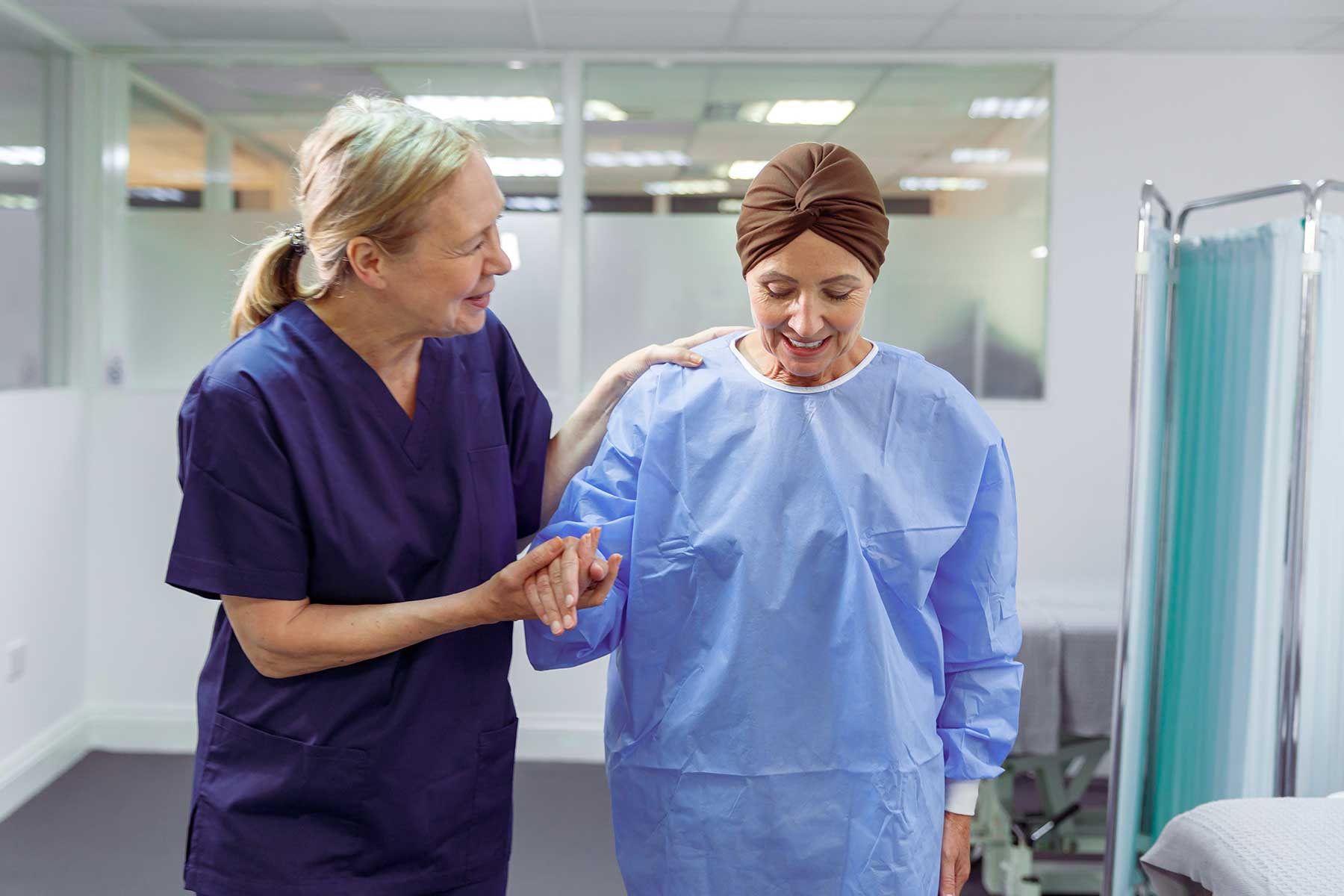For many Australians, they will either experience or have a loved one experience cancer throughout their lives. A disease of the body cells, cancer can come in many forms in our bodies and has been long linked to death across the world.
However, with the ever-present development of medicine, people who develop cancer throughout their lives are not only able to receive life-saving treatment, but strong preventative health measures may eliminate some cancers entirely. These measures have extended the life of people dealing with cancer significantly.
As the way we treat cancer changes, the role of the cancer nurse will evolve in line with these changes, and it is critical that every nurse knows about the adaptions needed to keep up with best practice cancer care.
At the Australian College of Nursing (ACN), cancer nursing expert Christine Collins MACN heads the Graduate Certificate in Cancer Nursing and is on the front line ensuring nurses are given the skills and knowledge to provide the best care for consumers.
She answers all your questions on cancer nursing and what you need to know.
What cancers do nurses often work with in Australia?
Australian nurses see and care for various cancers ranging from solid tumours, blood cancers, hereditary, and rare cancers. The most common cancers diagnosed in Australia are prostate, breast, colorectal (colon and bowel), melanoma (skin cancer) and lung cancer.
This means our nursing workforce must be equipped to face the challenges of providing prompt and timely assessment and implementing treatment and quality individualised care. Nurses are involved at every stage of a person’s cancer journey and having specialised trained nurses has been shown to improve the health outcomes for individuals and their careers.
How can nurses benefit from learning more about cancer nursing?
Cancer nursing is a specialty all nurses need to have some knowledge about.
Unfortunately, two in every five Australians will be diagnosed with cancer before the age of 85. This means all nurses will likely be looking after an individual with a cancer diagnosis at some stage in their career.
Evidence-based cancer treatment relies on the collaboration and expertise of many specialties working together. Systemic therapies, radiation therapy, and surgery are all essential aspects of cancer treatment. The nurses within those specialties need to understand their vital role in delivering high-quality care and how one treatment can impact and support the next.
Deciding to learn more about cancer means a nurse can become more involved in clinical decision-making and advocate for those in their care. I have always enjoyed the specialty of cancer nursing and the unique opportunity it offers you. It is a field that evolves rapidly, and you see the advancements in treatment, symptom management, and supportive therapies and the impact these changes make on the lives of those around you.
What changes have you seen in cancer nursing since you started as a nurse?
Treatments and therapies have changed and improved so much within my career. The development and implementation of The Optimal Care Pathways, the national framework for cancer care delivery, has significantly contributed to providing equitable, safe and evidence-based treatment for all Australians.
These specialised pathways ensure all Australians, including those with known health disparities such as our First Nations peoples, have a treatment trajectory individualised to their needs. For our nurses, this means they have a nationally endorsed clinical pathway so they can be better advocates to enable every individual to receive the same high level of care regardless of where they choose to receive treatment.
The advancement in immune and targeted therapies has been a welcome change. Generalised systemic therapies are in some instances able to be replaced with a targeted treatment option that is shorter in duration and shows fewer side effects which is life changing. I believe we will see chimeric antigen receptor (CAR) T-cell therapy used more widely in Australia in the next few years, as it is showing promising results in clinical trials for so many cancer streams and is being used successfully in cancer centres overseas.
The cancer nursing specialty has changed and is becoming recognised for not just the specialists of venepuncture, cannulation and chemotherapy administration but our knowledge of bone marrow function and the intricate workings of the immune system. Cancer nurses contribute to advancing cancer clinical trials and leading the way for advanced practice nursing roles.
How has cancer survivorship changed over the last ten years?
Clinicians now commence planning the survivorship journey at diagnosis. This means assessing individuals’ unique emotional and physical needs and integrating evidence-based treatments to enable them to live long and fulfilling life after initial treatment.
Cancer survivorship is complex, as it needs to include concepts specific to cancer and incorporate and adapt to the individual’s lifestyle and healthcare needs as they change over time. The model of survivorship care in Australia supports and educates individuals on managing long-term side effects of cancer and treatments, psychological needs unique to them, and the assessment and management of cancer reoccurrence.
Recognising the need for early fertility preservation and focusing on the individual’s mental health after primary treatment has been completed has been an advancement in this field.
How can nurses take these trends into consideration in providing their best-practice care?
Nurses have a unique opportunity to influence the individual’s cancer journey every step of the way.
Cancer treatments are usually long in nature, and the follow-up care and monitoring continue for many years. The long-term treatment is where the unique relationship of a cancer nurse and those individuals within their care has been shown to be so important.
Having the skills to critique the extensive literature and apply it directly to clinical practice means nurses need to have access to education. Individuals deserve to receive evidence-based treatment and supportive therapies, and cancer nurses are at the bedside implementing this every day.
After the challenges COVID-19 presented to the healthcare landscape, it is so vital we ensure cancer surveillance programs and early detection screening are given the priority they need. Early detection directly influences cancer treatment options, so as nurses, we must promote this among colleagues, our communities and patients.
Cancer nursing has allowed me to make life-long friends with my colleagues and given me the privilege of impacting individuals to gain access to the care they deserve. It is a very rewarding specialty of nursing, and I would welcome the opportunity to enable other nurses to learn about this specialty.
Graduate Certificate in Cancer Nursing
The Graduate Certificate in Cancer Nursing gives nurses working with people with cancer the opportunity to develop strong knowledge and skills in the field of cancer education, prevention, diagnosis, pathology, treatment, survivorship and palliative care. Applications for the next intake are now open. More information is available on our website.
Christine Collins MACN
Christine considers herself a lifelong learner with a passion for educating through mentoring, and the development of practical, equitable learning resources. Christine has a focus on adult learning through leading and training future educators in the nursing profession. Her priority is to help nurses put theory into clinical practice. It is Christine’s goal to equip clinical nurses with the skills they need through collaboration, respect and empowerment.






